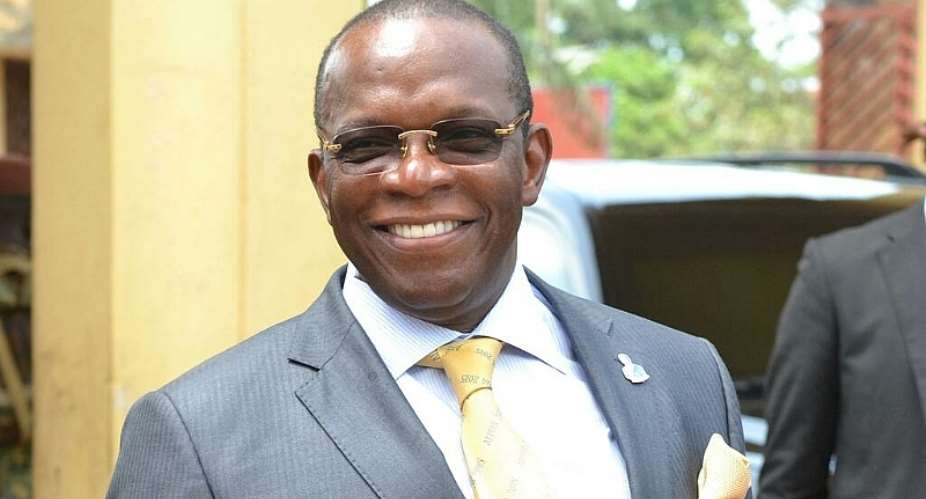Former prime minister Ibrahima Kassory Fofana and three ex-ministers in the Guinea-Conakry have reportedly been detained on embezzlement charges.
Ibrahima Kassory Fofana served as prime minister under ex-president Alpha Condé from May 2018 until September 2021, when the army ousted the elected government in a coup.
According to lawyer Salifou Beavogui, Fofana along with former defence minister Mohamed Diane, ex-environment minister Oye Guilavogui and former hydrocarbons minister Zakaria Coulibaly "have been charged with embezzling public funds and put in prison."
The four are expected to go on trial next Monday.
Corruption allegations not yet revealed
Beavogui added: "We believe that they do not deserve to be in custody as, pending evidence to the contrary, they have the right to the presumption of innocence. We are dealing with a hasty and punitive procedure."
The four were ordered to be held after being cross-examined for three days. The details of their alleged offences have not been made public.
The detentions come amid a crackdown on alleged graft by coup leader Colonel Mamady Doumbouya.
The authorities last month razed the house of former prime minister Cellou Dalein Diallo - a three-time presidential candidate - saying it was state property that was obtained illicitly.
Diallo is also being investigated for alleged self-enrichment over the sale of assets in 2002 of the country's bankrupt airline, Air Guinea.
He denies the allegations.
- Guinea's junta says ousted leader Alpha Condé has returned home
- What we know about Guinea coup leader and war master Mamady Doumbouya
Since 2021 coup d'état, no return to democracy on the horizon
In 2010, Condé became Guinea's first democratically elected president.
He was deposed by army officers at the age of 83 amid protests over his successful bid for a third term in office - a plan that critics said breached the constitution.
Doumbouya had himself sworn in as president last October.
He has vowed to reform the electoral system in order to hold "free, credible and transparent" elections, but has so far resisted to committing to a date.
Meanwhile, the military junta has set up a special court for dealing with corruption cases.
It has also expelled numerous executives from the state services as part of its anti-graft drive.





 Akufo-Addo spotted ordering chiefs to stand for his handshake
Akufo-Addo spotted ordering chiefs to stand for his handshake
 Akufo-Addo ‘disrespects’ every chief in Ghana except Okyenhene — NDC Communicato...
Akufo-Addo ‘disrespects’ every chief in Ghana except Okyenhene — NDC Communicato...
 Supreme Court clears way for dual citizens to hold key public positions
Supreme Court clears way for dual citizens to hold key public positions
 Be transparent, don’t suppress the truth – Prof. Opoku-Agyemang to Jean Mensa
Be transparent, don’t suppress the truth – Prof. Opoku-Agyemang to Jean Mensa
 ‘I won’t tell the world I was only a driver’s mate during challenges’ – Prof Jan...
‘I won’t tell the world I was only a driver’s mate during challenges’ – Prof Jan...
 We’ll prosecute corrupt officials of Akufo-Addo’s govt – Prof Jane Naana
We’ll prosecute corrupt officials of Akufo-Addo’s govt – Prof Jane Naana
 [Full text] Acceptance speech by Prof Jane Naana Opoku-Agyemang as 2024 NDC Runn...
[Full text] Acceptance speech by Prof Jane Naana Opoku-Agyemang as 2024 NDC Runn...
 Election 2024: Don’t be complacent, we haven’t won yet – Asiedu Nketia cautions ...
Election 2024: Don’t be complacent, we haven’t won yet – Asiedu Nketia cautions ...
 Election 2024: Stop fighting over positions in Mahama’s next govt – Asiedu Nketi...
Election 2024: Stop fighting over positions in Mahama’s next govt – Asiedu Nketi...
 Prof Jane Naana Opoku-Agyemang will restore dignity of vice presidency – Fifi Kw...
Prof Jane Naana Opoku-Agyemang will restore dignity of vice presidency – Fifi Kw...
